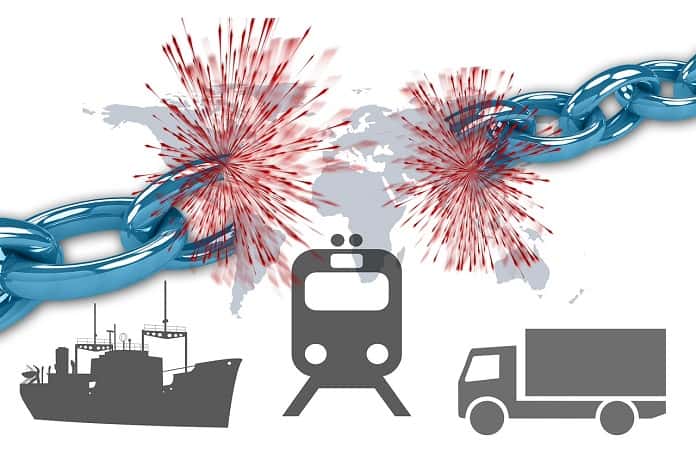New research from Capgemini reveals that three-quarters of organizations have been impacted by closing facilities, supply chain disruptions, employee absence, and remote work in the past three years, and less than 20% of organizations feel equipped to handle the impacts of these changes. Capgemini Research Institute’s report, “How greater intelligence could supercharge supply chains”, explores how organizations across industries can leverage technology to create resilient, sustainable, and intelligent supply chains to navigate these disruptions and adapt in real-time.
Greater focus on sustainability, global socio-economic changes, and shifting consumer demands has meant that organizations are facing considerable disruption to their supply chains. In this context, leaders’ most pressing concerns are reducing CO2 emissions across all tiers of the supply chain (95%) and growing e-commerce volumes (90%). Around 92% of organizations surveyed said that the ongoing relocation of the global supply chain will impact them but only 15% are equipped to deal with this.
Investing in supply chains now is critical for organizations to be prepared to meet future demands, cites the report. On average over the next three years, organizations plan to increase their investment in supply chain transformation by 17% and expect to double their business outcomes in terms of growth, profitability, and sustainability.
“There are numerous building blocks that need to come together to create a future-ready supply chain network and provide differentiated offerings that customers are looking for. The last few years have highlighted the need for organizations to build agile and resilient supply chains, not only to cope with disruptions but also to help them stay ahead of the curve, especially from a sustainability perspective,” comments Mayank Sharma, Global Supply Chain Lead at Capgemini. “It is clear that there’s no one-size fits all solution, but organizations that lay the foundation for a data-driven, technology-enabled, scalable, and sustainable supply chain are the ones that will reap the most impressive returns in terms of driving improved customer loyalty, creating more business value and meeting sustainability goals.”
The report highlights a need for organizations to design resilient, connected networks with integrated data-driven planning. It suggests that technology will be a critical enabler here, giving organizations access to real-time insights which in turn can enhance the ability to predict change and help them plan for possible future scenarios.
‘Supply chain masters’ – organizations defined as having displayed the ability to successfully balance multiple demands on their supply chain – are already reaping business benefits. The research found that this small cohort of respondents (9.5%) reported a 15% incremental growth in revenues, a 17% reduction in CO2 emissions as well as a 1.8 percentage point higher market share when compared with others.
Focus on sustainability is crucial
Supply chains currently account for over 90% of an organization’s greenhouse gas emissions. Companies are increasingly reshaping business strategies to prioritize sustainability, with many setting top-line targets to improve the overall environmental impact of their products and services. There is a clear need for supply chains to be at the core of these sustainability initiatives.
The vast majority of organizations surveyed (95%) recognize the need to reduce CO2 emissions across the entire supply chain, but only 13% feel well prepared to handle these changes. Currently, reducing Scope 1 emissions dominates an organizations’ sustainability initiatives (38%), versus scope 2 and 3 emissions which account for 22% and 27% respectively. The report suggests that sustainable practices must be adopted across the value chain with transparent metrics set to measure performance plus real-time tracking systems implemented to monitor performance. Investing in supplier training and education initiatives will help to empower stakeholders to make a real impact and enable an organization to reach its sustainability goals.
The research found that only one in four have started scaling sustainability initiatives in their supply chains, highlighting opportunities for organizations to improve.
Embrace automation and technology for robust management
As organizations plan to increase investments in supply chain transformation, the report suggests there will be considerable focus on change management and upskilling stakeholders. It will also be important to improve collaboration with ecosystem players (customers, suppliers, peers), as well as invest in automation and robotization to improve operational efficiency and redeploy resources (such as customer interactions, analysis, dynamic planning and decision-making).
Building a composable, integrated, and customer-centric architecture will enable organizations to respond quickly and mitigate supply or fulfillment risks. This combines a transactional backbone and best-in-class industry solutions for execution, as well as data-sharing and collaborative platforms that break down siloes, enabling end-to-end management of the supply chain. Integrating existing, otherwise-siloed supply chain management systems will enable organizations to collate, analyze and react to the huge volume of internal and external data that a network produces. The research found that supply chain masters stand out from other players by how quickly and accurately they complete this process of aggregating, analyzing, and acting upon data. Those who adopt a centralized “control tower” approach, where data is collated in one cohesive and connected dashboard, will help break down silos within the supply chain network to provide end-to-end visibility that enables harmonized management.















Thank you for sharing such an informative blog